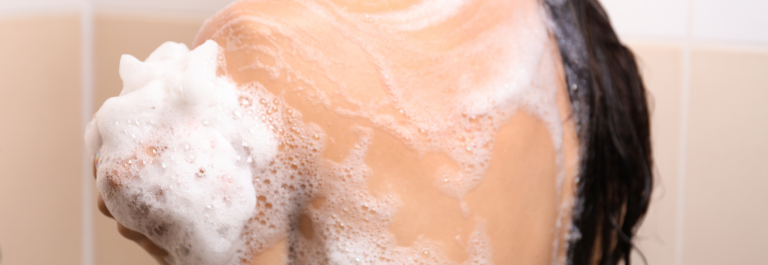It is highly likely that at some point in your lifetime, you'll experience itchy skin, also called pruritus.
Whether your skin's been dried out by cold weather, you're coping with an allergic reaction, or living with a more serious internal disease, there are many possible causes for irritated skin, and we're here to explore some of the most common culprits.
Throughout this post, we'll explore everything you need to know about:
-
The common causes of itchy skin
-
When to consult your doctor
-
How to treat and prevent itchy skin conditions
Keep reading to learn more about why you might feel itchy and how best to soothe skin irritation and stop incessant scratching.
Common Causes of Itchy Skin
Itchy skin will feel different for everyone, ranging from a mild irritating sensation to a burning or stinging pain.
With itchiness being triggered by a vast range of external and internal factors, pinpointing the cause for itchy skin can be overwhelming. However, getting to the bottom of the reason behind your itching is vital in ensuring you access the right treatments.
Irritants and Allergies
The outer layer of your skin is coated in a protective skin microbiome - a community of thousands of helpful microbes that work alongside your immune system to protect your body against environmental irritants, allergens, and infections.
If an irritant or allergen breaches your skin's barrier, your body's inflammatory response may be activated. Common triggers for an itch include:
-
Synthetic fabrics
-
Certain metals
-
Harsh chemicals found within commercial soaps and cleaning products
-
Certain foods, such as peanuts or shellfish
-
The venom of an insect bite
-
Poison ivy
Allergic reactions are responsible for developing many itchy skin conditions, such as contact dermatitis and hives.
Skin Conditions
In many cases, itchy skin may be caused by an underlying condition driven by genetic and environmental factors.
Eczema
Unlike some skin rashes, eczema is not contagious. Eczema refers to a set of chronic, inflammatory skin conditions characterized by dry skin and severe itching. There are many varieties, with some of the most common types including atopic dermatitis, seborrheic dermatitis (which typically appears on the back or scalp), nummular dermatitis, and dyshidrotic eczema.
For people with eczema, itching tends to be caused by an overreactive immune system and a weakened skin barrier, which is more susceptible to moisture loss and more sensitive to environmental triggers.
Psoriasis
Psoriasis is an autoimmune disease that affects around 125 million people worldwide.
While symptoms may vary from person to person, this skin condition is characterized by thick, scaly patches of skin that cause an intense itch or burning sensation.
It is caused when the body overproduces new skin cells, which build up dry, dead skin 'plaques.'
Prickly Heat
Prickly heat (heat rash) is caused when your sweat ducts become clogged, trapping perspiration under the skin. As the rash bumps burst and sweat is released, you may feel a prickly, itching sensation across the skin.
The Dangers of Scratching
In the case of an itchy rash, scratching at your skin creates tiny micro-ruptures in your skin's surface, aggravating the delicate nerve endings.
That's why, while itching might feel irresistible at the moment, scratching can worsen the itch-scratch cycle, making it even more difficult for your skin to recover.
Internal Causes
Sometimes, the cause of your itchy skin is more than skin-deep. Particularly if your symptoms are proving persistent or spread across your whole body, your itchy rash might be a sign of an internal disease or infection such as:
-
Liver disease
-
Obstetric cholestasis (a rare disorder that affects the liver during pregnancy)
-
Skin cancer, as well as specific cancer treatments
-
An overactive or underactive thyroid
-
Diseases that affect the nervous system, such as diabetes and shingles
-
Piles (which causes enlarged blood vessels in the rectum and anus)
-
Psychiatric conditions such as anxiety, ODC, and depression may also manifest in physical symptoms such as itching
-
A sexually transmitted infection (STI)
-
The side effect of certain medicines
When Is It Time To See A Doctor?
If your symptoms persist, we suggest you consult your doctor to help solve the mystery of your itchy skin.
As we've seen, there are many possible causes for skin irritation, and it's essential to find a treatment plan that is tailored to your specific needs, whether that means applying topical lotions and creams or getting prescribed tablets or mental health support to help with internal diseases and psychological factors too.
How To Soothe Itchy Skin
While your doctor will be best placed to help you find a targeted method for treating your itchy skin, there are several steps you can start taking today to help break the itch-scratch cycle and feel more comfortable in your skin.
Use A Nourishing Moisturizer
Itchy skin is often perpetuated by dry, cracked skin, which struggles to hold and retain vital moisture. To bring relief, we recommend using an intensive moisturizer, such as the Nourish + Hydrate Manuka Balm, daily.
This buttery balm uses deeply hydrating natural ingredients, such as manuka honey, olive oil, and beeswax. Manuka honey is also loaded with vital anti-bacterial and anti-fungal properties, helping to fight secondary infection and to keep your skin healthy.
Wear Soft, Breathable Clothing
While mild itching is often nothing more than a nuisance, in severe cases (where itching lasts for more than six weeks), itchy skin can become extremely uncomfortable, disrupting your sleep and taking a toll on your mental health.
Your underwear is often the first point of contact with your skin, so you must find gentle, breathable garments made from hypoallergenic materials to avoid making your itchy rash worse or triggering your allergy.
The Remedywear™ Hypoallergenic Bra and Remedywear™ Men's Boxer Briefs have been made with TENCEL and anti-inflammatory zinc to provide lasting, soothing comfort for inflamed, itchy skin.
Heal Your Itchy Skin Today
Follow these tips to help you identify the cause of your itchy skin rash and find relief fast.










